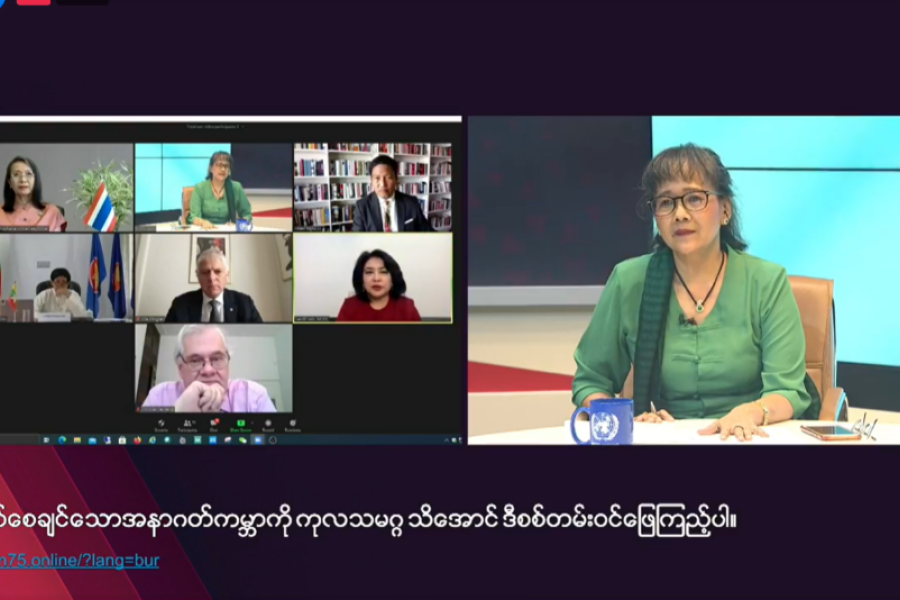Myanmar joins the world’s biggest conversation
၂၀၂၀ ခုနှစ် စက်တင်ဘာလ ၁၆ ရက်။
- (Myanmar text attached)
- Senior diplomats and foreign affairs experts in Myanmar have suggested the United Nations needs to reform to respond to new global challenges like climate change and disease outbreaks.
YANGON: Senior diplomats and foreign affairs experts in Myanmar have suggested the United Nations needs to reform to respond to new global challenges like climate change and disease outbreaks.
Celebrating the 75th anniversary of the founding of the UN in 1945 after World War Two, the diplomats came together on a special program hosted by Skynet One News. The program was carried on Facebook Live on the UN Myanmar Facebook page, and will be re-broadcast this Sunday at the Weekends with Susu Thatun show on the Skynet One News Channel.
The UN Secretary General, Antonio Guterres says he wants “the world’s biggest conversation” to help shape the future of the UN and the UN in Myanmar brought together the panel to discuss the future of multilateralism. Dozens of people in the Facebook Live audience asked questions.
The eminent former Myanmar diplomat, U Khin Maung Lynn, who is Joint Secretary of the Myanmar Institute of Strategic and International Studies (MISIS) said Myanmar had enjoyed very good relations with the UN and added the UN must adjust to the new world.
"It has saved lives," he said. "It has helped Myanmar to halve child mortality and increased nutrition among school children through food programs.
"Can the UN adapt to the world we know today?
"It needs self examination and must reflect on the world we have today.
"Myanmar can better contribute to UN agencies and help the world reach the Sustainable Development Goals."
The Thai Ambassador to Myanmar Ms. Suphatra Srimaitreephitak said the UN must be productive, relevant and meaningful to all stakeholders.
The French Ambassador to Myanmar Mr. Christian Lechervy discussed the important role the UN has played over 75 years.
"The UN is the best instrument we have for peace."
“Global, regional and sub-regional co-operation is how we deal with the world of tomorrow.
“The number of conflicts has diminished in the past 30 years as a result of UN actions and collective actions.
“It protects and promotes human rights through more than 80 treaties.
“It also defines the world’s environment agenda.”.
Historian and foreign affairs expert, Dr Thant Myint-U, who worked on reform at the UN, said the organisation was often left to deal with problems which were "intractable or very difficult" which other bodies could not solve.
He called for bureaucratic restructuring. "We have to move away from a system where the member states put their own people into the UN bureaucracy. It hollows out the bureaucracy of the UN and affects staff morale. The UN needs the very best people available. "
Sandii Lwin founder and Managing Director of Myanmar Health and Development Consortium and a development expert, pointed out the UN was well placed to respond to COVID-19 through inclusive dialogue.
"The UN creates a climate of collaboration, which will be especially important when the vaccine for COVID-19 is ready."
The program was led by Dr. Susu Thatun, host of the first bilingual television talk show on One News, featuring views and discussions around issues of interest in Myanmar within a larger regional and international context.
Formerly, a senior advisor to the UN Resident Coordinator in Myanmar, she took questions from the online Facebook audience.
U Khin Maung Lynn told the viewers that Myanmar is moving back to the international community through democratic traditions.
"But our friends must understand this requires patience and tolerance and the international community, including the UN, must understand our history. It should undertake more staff training and invest more in knowledge.
"It is a pity we haven't achieved peace in 70 years, it will take more time and understanding."
The UN Resident and Humanitarian Coordinator, Ola Almgren, thanked the panel for helping the UN with the conversation about its future.
"Some UN reform has been successful, some less so," Mr Almgren said. “Collective action has been successful.
"It is the only place the world can discuss its difficulties and seek shared solutions.
More than three generations have gone by since the United Nations was formed on the back of two world wars, and many who live today may think of the organization as something of the past.
“And yet, I would argue that the three main pillars that make up the foundation of the United Nations: faith in fundamental human rights; respect for justice and the obligations arising from treaties and international law; and promotion of social progress, remain as valid as they have ever been.
“They are a collective framework needed to address the challenges of today’s world, whether related to persisting inequalities and the hundreds of millions who still live in extreme poverty, continued conflict that brings misery to millions around the world, or the fact that our planet is dying if we don’t act quickly to save it.
“The global crisis brought by the Covid-19 pandemic is just an additional illustration of how global challenges need global solutions and an organization which brings nations together around these.
"Throughout my career with the United Nations, I have met many people who have been appreciative of our work but also those who have been highly critical and I accept both. Given the challenges of today’s world, we can and must do better which is why we are seeking a global conversation on the UN we need to guide us and our Member States as we move forward."
Mr Almgren encouraged people to show what they think is important for the UN's future and fill out the international survey which is available online in English and in Burmese.
"We are listening," Mr. Almgren said.
ends








